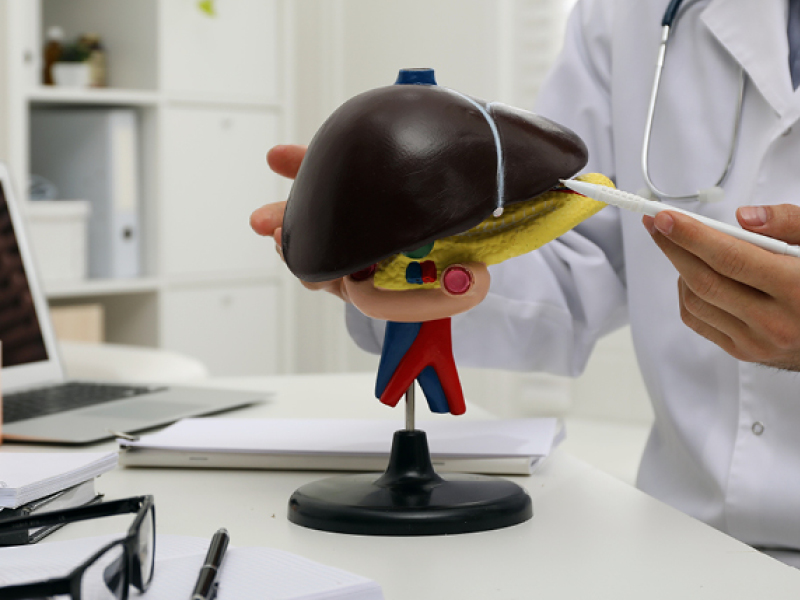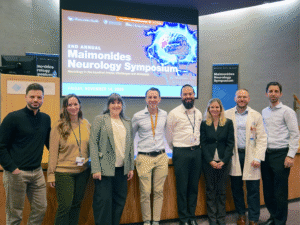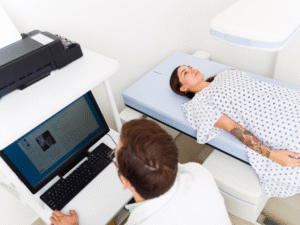Hepatopancreatobiliary (HPB) diseases — conditions that affect the liver, bile ducts, and pancreas — are on the rise. Within five years, the incidence of these diseases will likely be double* what it was in 2000, according to the National Institutes of Health. Consequently, there’s a need for capacity to deliver the most advanced therapies to the growing number of patients who need it.
Maimonides Health is answering the need with the new Maimonides Liver, Bile Duct, and Pancreatic Surgery Program launched in April. As the only program of its kind in Brooklyn, this initiative brings together a highly trained team of hepatobiliary and gastrointestinal surgeons. These experts work closely with other multidisciplinary providers to deliver leading-edge medical care and surgical treatments.
“Hepatobiliary and pancreatic procedures can be challenging and complex. So, these surgeries are offered only in highly specialized hospitals,” says Vadim Nakhamiyayev, MD, PhD, Chief of the Maimonides Liver, Bile Duct, and Pancreatic Surgery program. “Maimonides is one of the few hospitals anywhere that performs these operations because we have experienced specialists and the most advanced tools to complete the most complicated surgeries.”
Delivering Complex Hepatopancreatobiliary Disease Treatment
Performing surgery on patients with malignant or benign pancreatic and hepatobiliary disease is challenging. Anatomically, the liver, bile ducts, and pancreas are not easily accessible. They are complex, delicate, and located very close to other vital structures. Because they are so rich in blood supply, the risk of excessive bleeding during an operation is high.
With 35 years of experience, a PhD in reconstructive bile duct surgery, significant research experience in liver tumor treatment, and highly specialized pancreatic surgery skills, Dr. Nakhamiyayev is passionate about bringing his expertise to as many patients as possible here in Brooklyn.
He heads a team of two fellowship-trained, board-certified hepatopancreatobiliary surgery experts. Together, they will treat hundreds of patients with pancreatic and hepatobiliary disease annually, and they are uniquely equipped to perform these procedures. They collaborate closely with providers in other specialties, including hematology, oncology, pathology, and interventional radiology, to deliver the high-level, comprehensive care these patients need.
“At Maimonides, we offer the highest standard of tertiary care available. We take a multidisciplinary approach, working as a group to address the complex needs of every patient’s case,” he says. “Whatever the condition or procedure, we are well versed in caring for our patients during and after surgery.”
Diagnosing a Wide Range of Conditions
For many patients, the first signs of HPB disease include jaundice, weight loss, and abdominal pain. Many diseases are malignant and aggressive, but some are benign. Maimonides providers are experts in detecting liver, bile ducts, pancreas, esophagus, stomach, and intestinal tract cancers. They can also identify a wide range of other hepatobiliary problems, including bile duct injuries, biliary strictures, cysts, inflammation, and neuroendocrine tumors.
Once referred, patients can usually expect to be seen within a week, and Maimonides’ HPB disease experts will quickly commence the comprehensive diagnostic process. The team relies on the most advanced imaging tools to accurately detect and diagnose a patient’s condition. For example, they use leading-edge CT scans to capture high-resolution pictures of the patient’s smallest arteries, blood vessels, and veins to identify any signs of disease.
Leading-Edge Techniques to Treat Hepatopancreatobiliary Disease
At Maimonides, we offer the full range of treatments for hepatopancreatobiliary disease. While some patients can be treated with a combination of chemotherapy, surgery or radiation, a resection — complete tumor removal — is still the most effective treatment option. And our providers have extensive experience in the most advanced minimally invasive, laparoscopic, and robotic procedures for excising liver and pancreatic tumors. They also have several other methods to destroy tumors, including radioembolization and NanoKnife, the most advanced radio-ablation tool that destroys tumors with thermal energy.
“These are very challenging procedures. Whenever we can, we opt for minimally invasive or laparoscopic techniques that give us the ability to remove tumors through small incisions,” Dr. Nakhamiyayev says. “Doing so helps our patients by reducing pain and hospital stays.”
Comprehensive, Personalized Care for Brooklyn’s Richly Diverse Communities
With the most unique hepatopancreatobiliary program in Brooklyn, Maimonides offers convenient access to the most advanced, comprehensive services. Each patient’s needs are different, so our providers focus on delivering personalized care.
“When we create a patient’s treatment plan, we bring together eight to 10 doctors. We design an approach based on a patient’s individual anatomy and then plan the right path for their pre-surgical, surgical and post-surgical care,” Dr. Nakhamiyayev says. “Everyone in the group participates in the discussion, and we make sure everyone agrees with the plan. That way, we’re confident in choosing the most effective course of action and delivering the best possible treatment option.”
This is particularly important to Brooklyn’s multicultural communities, he says. Hepatobiliary disease can affect anyone, and Maimonides has the expertise and patient navigation assistance, such as translation and interpreter services, to make high-quality care available to patients of all backgrounds.
“Hepatobiliary disease doesn’t discriminate between patients, so we are pleased to have the opportunity to deliver the care all our patients need,” he says. “Specifically, pancreatic cancers are on the rise in our Asian patient populations. With this program, we can directly engage with them and potentially catch their disease early.”
Ultimately, he says, this Maimonides program fills an urgent healthcare need.
“Treating HPB diseases is a very challenging task. We are proud to be among the advanced institutions that can provide these services,” Dr. Nakhamiyayev says. “We are staffed and equipped to handle the most complex, aggressive cancers.”
To learn more about surgery at Maimonides, visit our surgery webpage. To learn more about the Maimonides Liver, Bile Duct and Pancreatic Surgery Program or to refer a patient, call 347-305-3777 or 718-283-7952.
*https://www.ncbi.nlm.nih.gov/pmc/articles/PMC10886529/




